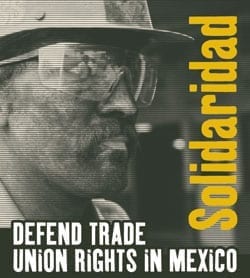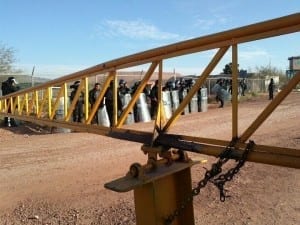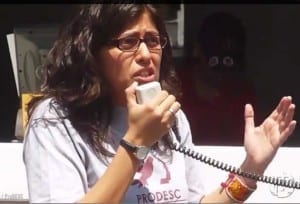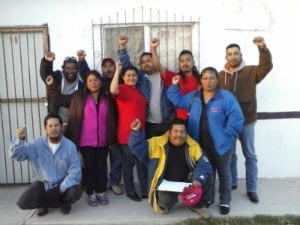Jun 2, 2014
 Worker rights advocates have lots of tools available to them to help foster safe and healthy workplaces, family-supporting wages and social protections. One item in the toolbox is rule of law—and a recent Solidarity Center analysis of Mexican laws and policies through the lens of a key international standard offers an example of how to utilize legal instruments to make positive change.
Worker rights advocates have lots of tools available to them to help foster safe and healthy workplaces, family-supporting wages and social protections. One item in the toolbox is rule of law—and a recent Solidarity Center analysis of Mexican laws and policies through the lens of a key international standard offers an example of how to utilize legal instruments to make positive change.
The Solidarity Center examined Mexico’s Constitution, federal law, public policies and common law (court rulings) and compared them with the obligations the country agreed to in 1981 when it ratified the International Covenant on Economic, Social and Cultural Rights (ICESCR).
Adopted by the United Nations in 1966 and in force since 1976, the ICESCR is a binding document signed by nearly all (162) countries. The IESCR covers issues such as forced labor, child labor, gender, migration and obligations to combat and reduce unemployment. It also includes extensive rights around freedom of association and the right to strike. The Solidarity Center compared three ICESCR articles with Mexico’s laws and conducted interviews and research to determine the extent of the country’s compliance. (The report will be out this summer—watch the Solidarity Center website for its release.)
Among the findings:
• Mexico’s 2012 labor law reform, in line with its ICESCR obligation to put in place a national employment plan and reduce the number of workers forced to make a living in the informal economy, has not fulfilled its goal of increasing jobs in the formal economy nor reducing informal-sector employment and overall employment.
• Laws in Mexico do not effectively limit the hours domestic workers can legally labor as part of its ICESCR obligation to protect the country’s 2.3 million domestic workers. Rather, the laws establish the possibility of a 12-hour day with no right to overtime pay, a violation of the country’s international obligations.
• Mexico’s labor law includes provisions to improve job safety and health, in accordance with the ICESCR, but many problems remain. For instance, new mining regulations cover coal but not other forms of mining, and attempt to regulate, but do not outlaw, artisanal mining, where many fatalities occur. The Labor Ministry, with one of the smallest shares of the federal budget, has limited resources for workplace inspections and even for the proper training of inspectors.
Such an analysis provides a concrete springboard from which unions and other worker advocates can pursue worker rights. Countries that ratify the ICESCR are obliged to report on the extent of their compliance, which includes enforcement, not merely implementation, of their ICESCR obligations. As a binding document, the ICESCR provides worker advocates a legal tool for pursuing fundamental socioeconomic rights based in international human rights norms.
Last year, the ICESCR Optional Protocol went into effect, giving individuals in countries that ratify the protocol the ability to seek justice for violations of their economic, social and cultural rights. Fourteen countries have ratified the optional protocol, including El Salvador, Gabon, Mongolia and Uruguay. The Optional Protocol can provide a key mechanism for improving worker rights, and unions and other civil society groups are well placed to advocate for its passage.
As part of the UN’s Bill of Human Rights, the ICESCR points to economic rights as essential to the fulfillment of human potential. As former South African President Nelson Mandela stated: “There is at times a tendency to view civil liberties as distinct from socioeconomic rights….There can be no more forceful refutation of that false distinction than the manner in which President Roosevelt formulated the generic freedoms of democracy

Apr 24, 2014
Alejandra Ancheita, founder and executive director of the Mexico City-based ProDESC (Project for Economic, Cultural, and Social Rights), is one of three finalists for the prestigious international Martin Ennals Award for Human Rights Defenders.
Ancheita, a Mexican lawyer and activist who leads the fight for the rights of vulnerable and excluded workers, migrants, communal landowners and indigenous communities, founded ProDESC in 2005. ProDESC is a long-time Solidarity Center ally whose work includes an ongoing campaign seeking justice for miners denied their right to organize for improved working conditions at the La Platosa mine in La Sierrita, Durango, Mexico.
“Alejandra is an unsung hero. She stands up in the face of widespread violence and impunity in Mexico—often risking her life so that Mexican workers can have justice,” said Solidarity Center Executive Director Shawna Bader-Blau. “Alejandra’s difficult and important work shines a spotlight on abuse and exploitation that generally goes unnoticed. We hope this honor helps diminish the risks she and her colleagues face every day.”
The Martin Ennals Award for Human Rights is selected by the international human rights community and given to human rights defenders who have shown deep commitment and face great personal risk. Members of the organization include Human Rights Watch and Amnesty International.
Watch a video about Ancheita.
Feb 28, 2014

Miners at the El Coronel mine in Zacatecas, Mexico, voted to join the union Los Mineros. Photo: Julia Quiñonez
Mineworkers at the El Coronel gold mine in Zacatecas, Mexico, have voted to join the National Union of Mine, Metal, Steel and Similar Workers of the Mexican Republic, known as “Los Mineros” or SNTMMSSRM in Spanish, with 425 workers voting for the union to be its bargaining representative.
A team of international observers from non-governmental organizations and unions monitored the election and reported that the “voting on February 21 was conducted in a substantively fair and transparent manner, free of interference from the employer or government officials.”
Three unions were represented on the ballot, including Los Mineros. As it has done on previous occasions when there is concern of violence or vote-rigging, the Solidarity Center convened an international team of observers to ensure that the voting process was fair. The team served as a visible presence seeking to reduce the risk of any clashes, intimidation, or harassment and to detect any irregularities in the process that could have hindered the successful completion of a free election. Members of the independent observation team are all trained and experienced in international protocols for election observation, such as only interviewing workers after they have voted and not asking workers which union they voted for or other personal information.
The team included representatives of the Solidarity Center, United Steelworkers (USW), Border Committee of Women Workers (Comité Fronterizo de Obrer@s (CFO), the Project on Organizing, Development, Education and Research (PODER) and Project for Economic, Social and Cultural Rights (ProDESC).
More details about the campaign are available from the USW.
Jan 3, 2014

Alejandra Ancheita, a Mexican human rights lawyer, is featured on Moral Courage TV.
Alejandra Ancheita, a Mexican human rights lawyer, bravely fights for social justice and human rights in her country–following in the footsteps of her activist father, who died under questionable circumstances on her eighth birthday.
She founded ProDESC, an organization that fights for economic, social and cultural rights and which is a Solidarity Center partner.
Ancheita regularly receives death and other threats for her support for vulnerable people in her country including as a direct result of her work to support workers and community members trying to win justice from a Canadian mine company in the state of Durango.
Her story is featured on Moral Courage TV.
Story in Spanish here.
Jun 20, 2013

Ten workers fired for union activity have refused severance pay. Credit: CFO
An international auto parts production plants has violated worker rights numerous times with actions that include a retaliatory mass firing and interference with union elections, according to a new report by the Worker Rights Consortium (WRC).
Since August 2011, the actions of Arneses y Accesorios de Mexico have “represented serious and clear-cut violations of international labor standards as embodied in the conventions of the International Labor Organization, as well as the codes of conduct of several of PKC’s customer firms,” according to the report.
In December, the Finnish-owned PKC fired more than 100 union supporters at Arneses y Accesorios, including the entire union committee, for campaigning for the election of an independent trade union, the National Union of Mine and Metalworkers (known as “Los Mineros”), a Solidarity Center partner, at their plants in Ciudad Acuña, Mexico. According to Los Mineros, the “workers were called individually to the human resources office and told to sign a ‘voluntary’ resignation letter. Officials of the Federal Labor Board were present and encouraged the workers to sign.” The union says workers were told that “the company has decided it no longer needs your services.”
The report found that the company denied workers the opportunity to exercise their right to freely join a union and bargain collectively by:
• Installing a so-called protection contract with the Confederación de Trabajadores de México (Confederation of Workers of Mexico, CTM), and subsequently using the agreement to prevent workers from freely exercising their associational rights. The CTM is a labor organization with a history of acting as “protection union” by assisting employers in blocking independent unionization efforts.
• Engaging in anti-union harassment and intimidation in the lead-up to a union election in October 2012. Such actions included directing managers to issue anti-union threats and hold captive audience meetings to dissuade workers from joining Los Mineros.
• Manipulating the union election by hiring short-term employees and directing them to vote for CTM.
The report also documented sexual harassment of women workers, who “provided credible testimony that Arneses y Accesorios managers pressured them to engage in sexual relations in exchange for promotions or other work benefits.”
The 20-page report lists recommendation for restoring worker rights at Arneses y Accesorios, which include immediately reinstating all workers dismissed in retaliation for exercising their right to freely associate and providing them with back pay.
Read the full report.
 Worker rights advocates have lots of tools available to them to help foster safe and healthy workplaces, family-supporting wages and social protections. One item in the toolbox is rule of law—and a recent Solidarity Center analysis of Mexican laws and policies through the lens of a key international standard offers an example of how to utilize legal instruments to make positive change.
Worker rights advocates have lots of tools available to them to help foster safe and healthy workplaces, family-supporting wages and social protections. One item in the toolbox is rule of law—and a recent Solidarity Center analysis of Mexican laws and policies through the lens of a key international standard offers an example of how to utilize legal instruments to make positive change.



